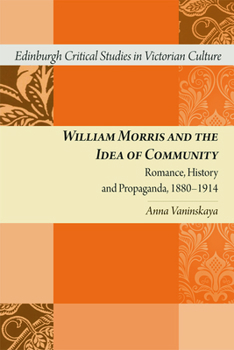William Morris and the Idea of Community: Romance, History and Propaganda, 1880-1914
(Part of the Edinburgh Critical Studies in Victorian Culture Series)
The great polymath William Morris and his contemporaries and followers - from H. Rider Haggard to H. G. Wells - are the focus of this study. Anna Vaninskaya draws upon a wide array of primary sources: from working-class fiction and articles in fringe socialist newspapers to historical treatises, autobiographies and diaries, in order to explore the many ways Victorians and Edwardians talked about community and modernity.Vaninskaya's narrative moves from the realm of romance bestsellers and sniggering reviews to debates in weighty historical tomes, and then to the headquarters of revolutionary parties, to street-corners and shabby lecture halls. She demonstrates how in each domain the dream of community clashed with the reality of the modern state and market.
Key Features
Brings together for the first time in one interdisciplinary study the worlds of fin de si cle literature, politics, and historiographyRedefines the terms of the critical debate about the late-Victorian romance revivalPuts into dialogue mainstream and marginal literary productionsUncovers the full extent of the contemporary radical appropriations of nineteenth-century scholarship Incorporates previously unexamined archival material





